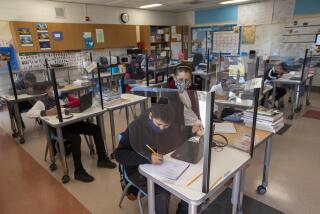Bilingual Education
- Share via
* Bilingual education undoubtedly makes non-English speakers more comfortable in their educational pursuits. It allows them to interact more with people who speak their same language, thereby making their transition into American schools easier. But by having such a comfort zone and by associating with speakers of the same language, bilingual students are falling into a trap. They are taking an easier, more painless route on their educational path, and as a result they will have a diluted and more superficial education than if they had pushed themselves by taking classes that were not in their mother tongue.
If one has the opportunity to study English in America, this chance should be used to its fullest. You should immerse yourself as much as possible in the language and culture. Bilingual education pulls non-English speakers away from these important interactions. The same goes for any other language, meaning that if you want to understand a culture different from that of your own, then you need to understand the language of that people. And you will only truly understand the language of that people when you immerse yourself in the culture.
Bilingual education means that the non-English speakers lose out on a cultural experience and the chance for self-improvement by learning another language. If you take the easier path once, then you are more than likely to make the same sort of decisions again, which in the end will be extremely unsatisfying. But by going to another place and being intense about learning the language and working hard, you are really setting a precedent for things to come.
BRAD PLOUGH
Goleta






